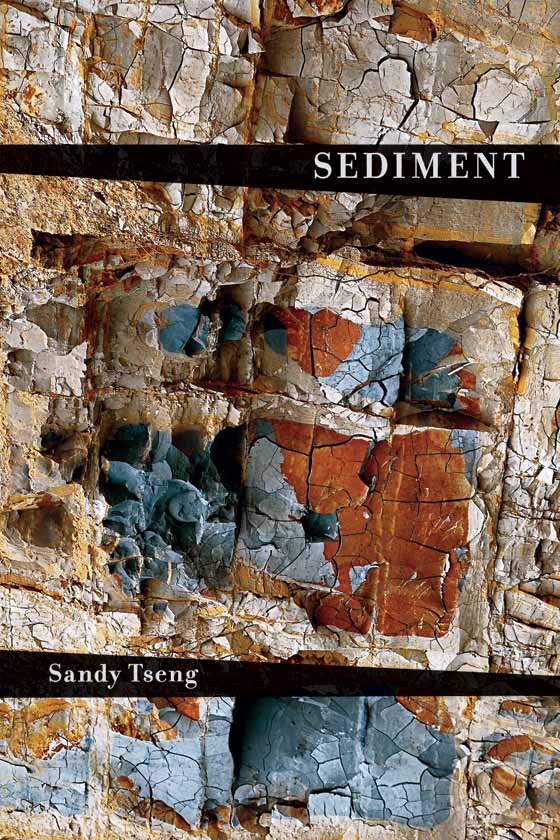
paper • 84 pages • 15.95
ISBN-13: 978-1-884800-93-1
A Stahlecker Series Selection
In Sandy Tseng’s finely-honed debut collection, Sediment, leaving is both what remains—the marks of our presence once we’ve gone—and the act of going to another place, a different culture, an unknown afterlife. “The island rebuilds itself over the loft and we rebuild over it,” eroding and erasing as we raise, replacing rote traditions with new mantras. Sediment asks what it means to belong and to possess in a time of upheaval, a time “in between languages,” when we “change the advisory from yellow / to orange, orange to yellow—/ we do not plan on running to the house / to get our belongings.” This book explores the pleasures and terrors of transition and translation, suggesting that language itself does not belong to us but waits, wanting a body: “Some words are better left gathering in the wind. / But we speak them.” Tseng writes, “We can never go back. I’ve wanted to pack everything into a box, ship it back overseas with a note explaining,” caught in the middle of competing cultures. In brittle, etched couplets, in poised, staccato sentences, and in searching lines that look back questioningly even as they forge ahead, Sediment seeks purchase on that shifting world. “Some things / we were never meant to keep,” suggests one poem, pondering what we should cling to, what let slip away, and how to make sense out of the possessions we’re left with.
Sediment is at once haunted, vivid, clinical: “on your white coat, the blood / of a stranger,” “the moon is the silver of stainless steel that sews your bone back together.” Through these accounts of immigration and migration, of family loss and being at a loss for what to do, we experience disjuncture in its unsettling familiarity, the way “there are people in restaurants eating their meals and people walking around crying. People washing out to sea.” These poems argue the need to emulate “the birds / that leave and come back with nothing. How content they are. / The beauty of having nothing.” They argue, too, that possessions might shore us, if only because “There’s something / premeditated in the way / an object is broken—” Having traveled with Tseng through the imaginary, lived, and left cities of Sediment , we learn not to forget nor to hold on but to read “negative space. The displacement of dust and roads.” We learn that the sediment of our lives—not just dust and past cities, but received traditions, half-recalled memories, accrued possessions—is also the fragment by which we recognize a future life, here or elsewhere. Sediment is an assured, challenging debut from a poet of great promise.
“This vivid and clean-lined debut weaves strands of personal and family narrative into short poems with wider symbolic force; the best of them contemplate both autobiography and ecocatastrophe. Tseng’s free verse creates strong moods: ‘Apple season, the dog eats his fill and falls asleep beside the space heater./ I thought the world was going to end years ago.’ Questions of East Asian immigration and assimilation dominate some early poems before giving way to more abstract spiritual dilemmas: ‘if our books burn up,/ we will suffer loss and still be saved,/ as those escaping through the flames.’ Tseng is equally at home depicting modern cityscapes and presenting far-flung rural locales. In both, she seeks sublimity while restricting herself to familiar words; in both she is able to see impending doom, as when the title poem presents the Indonesian tsunami and Hurricane Katrina in two haunting pages (‘The last thing we see is a wall of white crashing… Oil rig evacuations. Cars and cars against the sea wall’). In Tseng’s strongest work, everything takes on a surprising, religious dimension as the book drives to a close: ‘The voice of the Lord is upon the water,’ she warns: ‘he intends to strip the forests bare.’ — Publisher’s Weekly (Nov.)
“Tired of a world of short attention spans and frenetic entertainment, I was pleased to totally immerse myself into these quiet, patient, well-crafted poems. It’s been a long time since I have encountered a work of art that has so viscerally invoked my own painful memories of separation, abandonment and exile. This is a wonderful, compelling first book.” — Marilyn Chin
“Reading Sandy Tseng’s beautiful and grave first book Sediment is like walking into the invisible force of a great wind. You cannot see the force although you feel its effect everywhere. Only what is absolutely necessary survives in these poems. Images are not ornaments but glimpses, stilled as though by a strobe, in the rush of confusion and darkness of the world. ‘On your white coat, the blood / of a stranger,’ Tseng writes. This is an austere and powerful work.” — Lynn Emanuel
“The poems of Sediment—as remarkable for their resonant clarity as for their carefully distilled imagery—are everywhere haunted by cities: cities of memory, ancestry, displacement, cities of to abandon and to be abandoned. Tseng asks us to consider the differences between belonging and being claimed, to embrace equally the fact of longing and the fact that ‘some things / we were never meant to keep.’ A strong debut, indeed.” — Carl Phillips